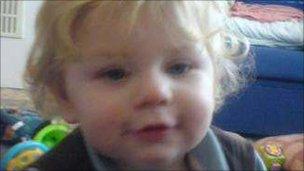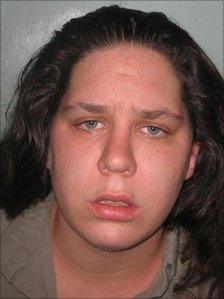Baby P examination details 'ignored' by official report
- Published

Peter Connelly died in August 2007 after suffering months of abuse
Details of a Great Ormond Street Hospital doctor's crucial medical examination of Baby Peter were excluded from the official report into his death, due to be published on Tuesday, BBC London has learned.
It will lead to questions about whether the NHS - and the famous children's hospital - were shielded from criticism over the case.
One of the authors of an earlier review into the case said he thought it could "discredit" the latest report.
Locum Sabah Al-Zayyat saw 17-month-old Peter Connelly at St Ann's clinic in Tottenham, north London, two days before he died - a potentially critical intervention.
But the official review did not look closely at her actions, claiming they were the subject of a separate inquiry.
A confidential report into Dr Al-Zayyat by one of the country's top paediatricians concluded Peter's condition should have prompted her to take urgent action.
He had at least a dozen bruises of varying ages on his back, and infections to his ear, scalp and index finger.
The report by Professor Jo Sibert said she should have admitted Peter to hospital for tests and alerted his social worker because he was on the child protection register.
He found Dr Al-Zayyat was not on the specialist register and had been appointed by Great Ormond Street with only limited experience of and training in child protection.
His report also criticised serious problems at the clinic, jointly run by the hospital and the Haringey primary care trust, where there was a lack of staff and poor case management. Doctors had few medical notes on the children they were examining.
But BBC London has learned that details of this report were omitted from the second serious case review - the official account of the agencies' failings over Peter.
Review 'inadequate'
The first serious case review into the toddler's death was ruled "inadequate" by Ofsted. The then Children's Secretary Ed Balls ordered a second one to be done.
On Tuesday, the coalition government will publish both the reviews, claiming the step is important to ensure there is "transparency" after such tragedies.
But the second review, endorsed by the previous government, glosses over Dr Al-Zayyat's examination at Haringey's Child Development Centre (CDC), even though it may have been a crucial point at which Peter's death could have been prevented.
The review makes no comment on the extent of the bruising and other injuries Dr Al- Zayyat saw on Peter's body, nor whether it was right of her to put off a full examination for three weeks and send him home.
Instead it says only: "Whether the doctors at the CDC should have taken a more serious view of Child A's (Peter Connelly) presentation at the interview has been the subject of another review."
It does not say what this other "review" was, nor explain the reasons for excluding the information from a report meant to be a comprehensive account of all the contact "agencies" had with Peter in the year up to his death.
It may lead to suggestions that the full extent of the failures of the health service in caring for Peter has been withheld from public view.
'Wrong' judgement
By contrast the serious case review makes extensive criticism of social workers involved in the case.

In 2009, Tracey Connelly was jailed for her involvement in her son's death
It accuses them of failing to take an "authoritative" approach to Peter's mother, Tracey Connelly, and challenging her to improve her parenting skills.
It argues they should have sought to take him into care when he was first placed on the child protection register in December 2006.
Their use of a close friend of Tracey Connelly to look after him at that time - and again a few months later - was the "wrong judgement", the report says.
The second serious case review - which is understood to have cost hundreds of thousands of pounds - was completed after four Haringey social workers had already lost their jobs and children's services director Sharon Shoesmith had been sacked by Mr Balls.
The perceived emphasis on social work failure, and conclusion that Peter's death could and should have been prevented, were helpful because they appeared to endorse his actions.
'Sorry state'
But details subsequently started emerging about Dr Al-Zayyat, Great Ormond Street Hospital and serious problems at St Ann's clinic.
Further questions were raised about the quality of child protection work in the NHS when the GP who saw Peter a week before he died was suspended after a disciplinary hearing before the GMC. He too had failed to take decisive action despite finding the boy in a "sorry state".
Fergus Smith, one of the authors of the original serious case review, said he was very surprised by the omission.
Mr Smith said: "Of course, for obvious reasons, it was a very critical part of the tragedy that Peter's story represents.
"It was certainly perceived to be that by ourselves during the first review and attempts were made to establish what had happened and who was accountable for the actual examination, and the context of the clinic.
"I think inevitably it's going to potentially discredit the second serious case review."
Dr Graham Badman, the chairman of the Haringey Local Safeguarding Board was unavailable for comment.
But a spokeswoman for the board denied it affected the credibility of the second serious case review, saying the report by Professor Sibert had been considered.
- Published25 October 2010